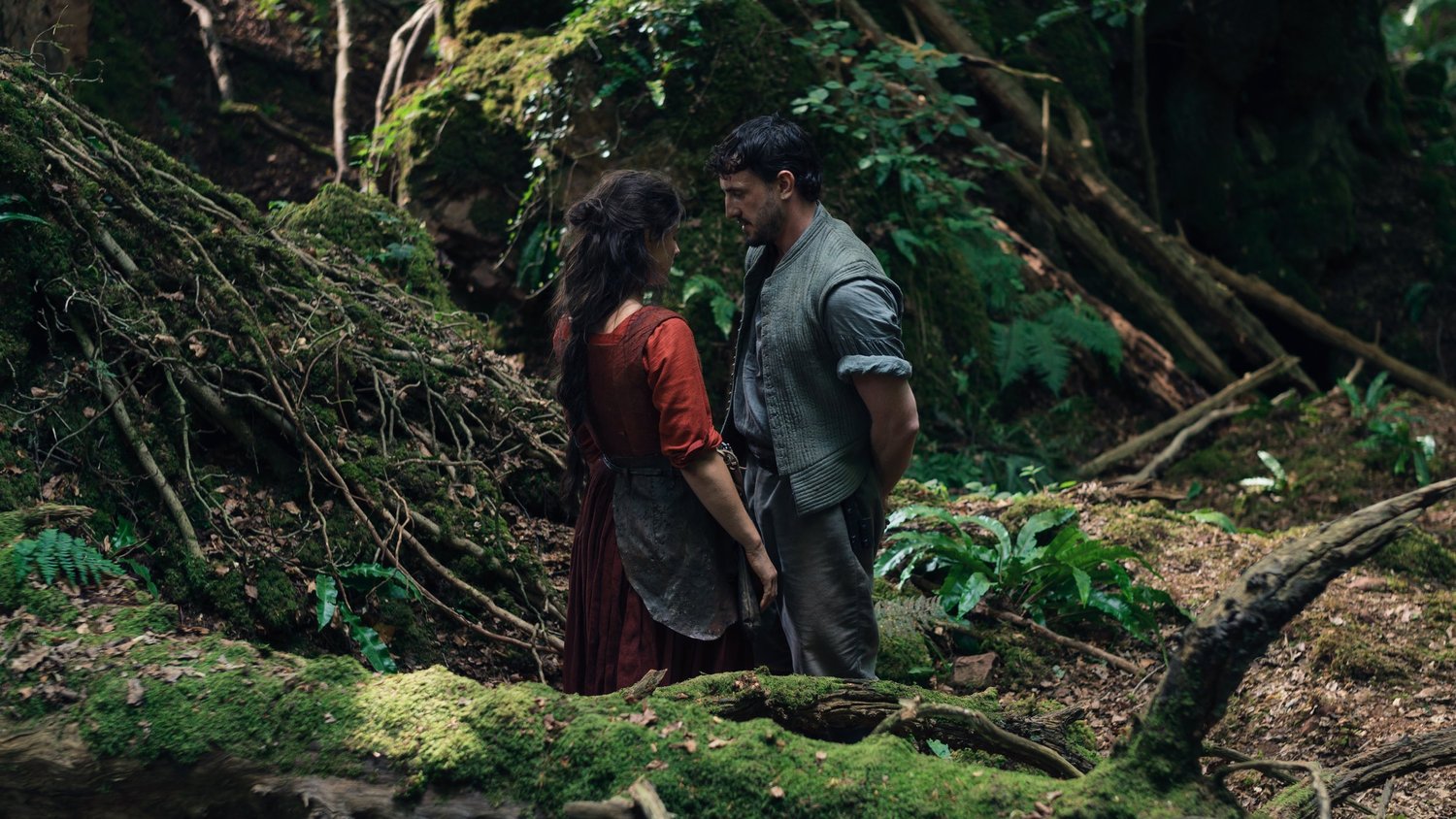Photos by Agata Grzybowska for Focus Features
Spotlight Presentation of the 61st Chicago International Film Festival
HAMNET— 5 STARS
After establishing an ethereal experience of courtship and family establishment, it’s no secret that the essence of Chloe Zhao’s wholehearted Hamnet comes down to sorrow and resilience in the face of mourning, and that the family experiencing it is that of William Shakespeare. To an individual, everyone goes to different places with grief, likely a combination of internal and external refuges. Even the Bard himself was quoted to say:
“To weep is to make less the depth of grief.”
LESSON #1: AN ARTIST’S RESPONSE TO GRIEF— True to those words, crying is a natural response, yet tears are not infinite. More action is needed to climb out of those doldrums. Some people seek privacy, choosing to bury their bereavement or vent it to close family or confidantes. Artists, like William Shakespeare, can be a different breed of creative introverts or expressive extroverts. Within those folks, a painful loss could galvanize them to consequently create an unplanned masterpiece.
Adapted from the dramatic license of conjecture penned by award-winning author Maggie O’Farrell in her 2020 novel of the same name, Hamnet postulates that the epic tragedy of Hamlet was William’s deeply personal response to the death of his son. Now, that crescendo of catharsis is merely the final third of Farrell’s novel and Chloe Zhao’s masterful film. A reaction-inducing climax and conclusion like that could only come from an equally important effort to establish the beautiful and challenging humanity of the people going through their ordeal.
Hamnet begins under a forested canopy to introduce a young woman (Academy Award nominee Jessie Buckley of The Lost Daughter) attuned with nature as she lies among enormous tree roots, which curve and cross to shape a large hollow-like opening at the base of a great tree. You can tell in seconds that this is her place of solace and likely one that others do not fully understand. Sure enough, Agnes is invested in the belief that she is the daughter of a forest witch—in that, like the other women of her family, she can see things others do not—where domestication inside walls and windows is not her ideal comfort zone or fate.
A young local language teacher (fellow Academy Award nominee and budding superstar Paul Mescal) in Stratford-upon-Avon who fashions himself as a writer of stories—a path seen as “useless” and “tradeless” by his male family members— becomes smitten with Agnes, and the attraction between the ostracised outsiders is lovingly mutual. She opens her more floral world to him, and the couple quickly marries and starts a family, beginning with the eldest daughter, Susanna (Bodhi Rae Breathnach, in her debut feature) and then, later, the harrowingly dicey birth of twins, Judith and Hamnet. Cinematographer Łukasz Żal (Cold War, The Zone of Interest) takes the introductory act and the happy expansion of the family—the era of living “with open hearts”—and envelopes Hamnet in Agnes’s idyllic perspective, both amongst the trees and in the household.
Agnes and her husband become imaginative parents with her vivacity for nature and his learned performative arts. As the children get older, their father begins to spend months at a time for several years working an unseen job in London, becoming the absentee parent that puts the child-rearing responsibility on Agnes, with the live-in support of her mother-in-law, Mary (the indomitable Emily Watson). His son Hamnet (Jacobi Jupe of Peter Pan and Wendy) comes to miss him the most with each departure.
LESSON #2: AGONY IN DEATH— As if the chilling fright of tragedy creeps up our limbs to our waiting hearts in Hamnet, there’s a strong lesson for both child and parent to never forget for a moment that a loved one could be gone, making any goodbye possibly the last one. As much as a parent should never have to bury a child, or a sibling shouldn’t have to bury another so young, a child should never have to face mortality. Dying in agony, Hamnet was scared, and the father he desperately loved wasn’t home to be there. That crushing weight of anguish and guilt now passes to haunt the ones who live on.
Forgive this personal aside at this point of my review, but watching the reactionary final third of Hamnet reminded me of Eric Clapton teaming with ace lyricist Will Jennings to pen and perform “Tears in Heaven,” which debuted on his 1992 MTV Unplugged special and the subsequent matching album. Even though Ad Astra composer Max Richter offers a lushly classical underscore, all I could hear was Clapton’s classic. His touching ballad—strummed with acoustic guitars far smaller and quieter than his old rocker tendencies—was written in tribute to the tragic death of his four-year-old son Conor and would go on to become the best-selling single of Clapton’s career and lift the MTV Unplugged album to become the greatest-selling live album of all time.
LESSON #3: MATCHING THE CATHARSIS— When I hear Clapton’s lyrics of “Tears in Heaven,” I’m instantly moved and transported to a different mental place. When I first heard it, I was a teenager who did not have the full empathy required to comprehend the song’s inspiration. Now, 33 years later, I find myself fathoming all of those parents who have lost “angel babies” before getting to know each other and sharing lives. It hits differently. Nonetheless, I still, then and now, reached an emotional level to match the catharsis. I believe Clapton didn’t write “Tears in Heaven” primarily to further his fame, and, romantically, for the sake of fictionalized storytelling, I don’t think William Shakespeare did the same with Hamlet. I think they became popular and revered masterpieces because they connected with listeners and viewers who could match or, even better, seek out the healing relief they provided.
In so many of her rustic works like The Rider and Nomadland, Chloe Zhao favors an artfully observant distance for shooting that allows her to fill her pristine frames with infinite ambience, magic hour vistas, and lived-in details. There’s a powerful patience to her mise en scène. That said, the slow build and the proverbial arm’s length of Mescal’s Shakespeare working out-of-town, off-screen, and away from his family can become, at times, a similar type of prohibitive distance for viewers in absorbing Hamnet. The melodrama may feel dreary and extremely overwrought.
Jessie Buckley’s otherworldly performance as Agnes is the undisputed central nucleus of the home front. Because Mescal represents the unnamed mystery nestled within the film, Hamnet becomes her flowing story, where those expecting the Bard’s wit, stageplay, and panache to turn a phrase must put those traits aside for a more ethereal mouthpiece and stoic figure. Buckley fulfils that shift and challenge with one of the most potent and formidable accounts of an actor this year. She deserves every bit of the awards attention coming her way.
At the same time, the biggest necessary release for one being able to match the aforementioned emotional deliverance has to come from Paul Mescal. In a brilliantly recreated “premiere” of Hamlet at the Globe Theatre, the previously hidden creative side of Mescal’s Shakespeare emerges in the crucial role of the Ghost of King Hamlet, speaking bottled-up anguish through his fatherly character to a Hamlet actor (Jacobi Jupe’s more famous older brother Noah of Wonder and the A Quiet Place series fame) who is slathered with makeup to be an unmistakably spitting image of Hamnet had he aged to become a young man. The realization of this proxy being a grieving person’s testament and Noah’s passionate and spot-on rendition of the play’s title character—coupled with Agnes’s fortuity to be in the front row to see it with her own eyes and reactions—can bring on the full waterworks, calling back to Shakespeare’s quote cited above.
For many, unfortunately, Hamnet’s poetically perfect and showy finale arrives so late that the rushed tardiness could cause some to miss the swelling effect. That’s a shame because there is no more moving ending to a film all year than this one. Find your own “Tears in Heaven”-esque link, and you’ll see the miracle. In 126 minutes, generational wisdom begets generational trauma, which manifests as the tortured artist’s performative dreams, which have been repeated and shared for centuries by others who match the catharsis. If Hamnet, as a film, can pull that echelon of heft from its viewers, it too will earn its own lasting legacy.
LOGO DESIGNED BY MEENTS ILLUSTRATED (#1355)



